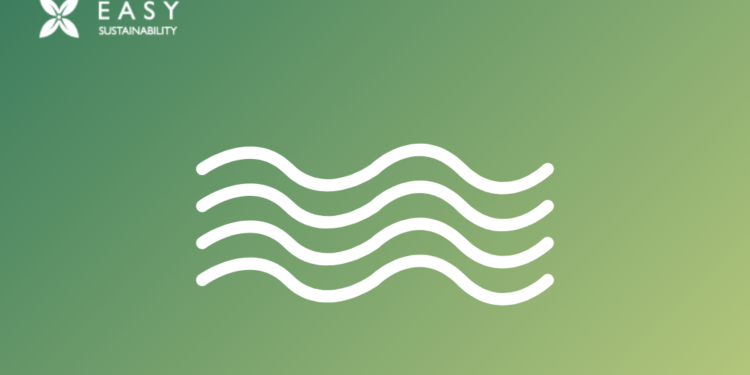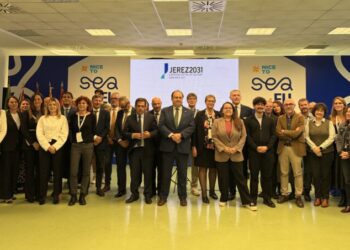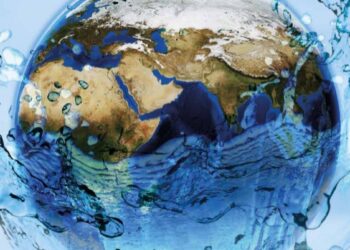Editorial – Easysustainability NGO – www.easysustainabilityngo.org
Water has always captivated the human spirit, binding us to it in countless ways, often causing us to forget our origins. Science shows that life began in primordial water ponds billions of years ago. The earliest unicellular and microbial organisms thrived beneath the surface, either seeking sunlight or descending into the ocean’s nutrient-rich depths. These early forms of life, like the Archaea, a single-celled organism that endures extreme conditions, are believed to be the ancestors of all life, emerging 3.5 billion years ago. From that point, life branched out, evolving into a vast diversity of species. Over eons, life forms transitioned from simple, single-celled organisms to complex, multicellular ones. Today, humans are one of the most remarkable species in terms of societal development and environmental impact. Yet, in the grand scheme of things, we are just a fraction of the Earth’s biodiversity. Scientists have identified approximately 2.3 million species of animals and plants, with arthropods—like insects, arachnids, and crustaceans—dominating the evolutionary ladder. Nearly one million arthropods have been cataloged, with millions more still undiscovered. Fungi and bacteria also represent a significant portion of Earth’s life, while humans belong to the Deuterostomia group, sharing our category with vertebrates, sea stars, urchins, and certain worms. This context serves to remind us that, as humans, we are merely a small part of the planet’s vast ecosystem. Yet, despite our relatively minor presence, our impact on the environment has been disproportionately large. Humans are responsible for nearly 100% of pollution, both directly—through consumption of natural resources—and indirectly, by triggering processes like greenhouse gas emissions through farming and industrial activities. We are the “black sheep” of our biological group. While starfish may harm coral reefs in Australia, their damage pales in comparison to the environmental destruction caused by human activities. The notion of responsibility has always been clear to me—if you break something, you must repair it. Unfortunately, this concept is harder to apply on a global scale. Pollution is largely the result of poor economic management. In our pursuit of survival and competition, we have neglected three critical principles: conserving finite natural resources, respecting the time nature needs to regenerate, and cleaning up after ourselves to promote sustainability and circularity.
Admittedly, these goals are difficult to achieve. We rely on natural resources to support a growing population and remain competitive in the global market. However, this approach has caused us to lose sight of the bigger picture: there is no Planet B. Every time we lose a species, we destabilize the intricate balance that nature has maintained for millions of years. Piece by piece, the balance becomes harder to sustain. Climate change, floods, and extreme weather events are no longer distant threats; they are our reality, and the point of no return is approaching. How serious is the situation in our oceans, and to what extent are humans responsible? The absorption of increased carbon dioxide by oceans has caused significant shifts in water temperature, ocean acidification, and deoxygenation. These changes disrupt marine circulation, chemistry, and species distribution. Since the industrial revolution, ocean acidity has risen by 30%, damaging plankton, dissolving shells, and harming coral reefs. River and lake temperatures are also rising, leading to dead zones that are inhospitable to cold-water species. Heavy rainfall further disrupts ecosystems, affecting plant growth and animal reproduction. Climate change is altering global weather patterns and threatening marine life. Longer droughts and more frequent floods are making freshwater management increasingly difficult. The ocean’s ability to provide essential services—like food, carbon storage, and oxygen generation—is weakening. Harm to seabeds and marine habitats releases even more carbon into the atmosphere, accelerating climate change. The European Union has set 2030 as a target to combat pollution and environmental degradation. Through initiatives like the Horizon Europe program and the “Restore our Ocean and Waters” mission, the EU aims to protect aquatic ecosystems, eliminate pollution, and create a sustainable blue economy. Central to this mission are four “lighthouses” established in the Mediterranean, Baltic-North Sea, Black Sea, and Atlantic-Arctic regions. These hubs will serve as centers for innovation, research, and investment, helping to achieve these goals. The mission has several objectives:
- Protect and restore aquatic ecosystems
- Eliminate pollution
- Create a climate-neutral, circular blue economy
- Bridge the knowledge and emotional gap surrounding climate issues
- Improve governance at national and international levels
By 2030, the mission aims to restore healthy and pollution-free oceans, a carbon-neutral Baltic-North Sea, and protected Danube River ecosystems. This effort requires participation from all sectors, including businesses, associations, and private citizens. A one-stop-shop Mission Portal has been created to track progress, provide investment opportunities, and engage citizens in ocean and water restoration efforts. The EU’s commitment is serious. In April 2024, funding increased by 1.4 billion euros, bringing the total to 7.3 billion euros. This financial support backs initiatives that address climate change, marine biodiversity, responsible consumption, and more. While over 800 projects have already been identified under the EU’s mission for marine protection, new opportunities are continually emerging. It’s important to highlight both stakeholders and key projects associated with the EU’s efforts:
- MARINEFF: This project focuses on restoring marine biodiversity in areas heavily impacted by human activities, such as ports. Funded under the INTERREG V/A France (Channel) England program, MARINEFF aims to enhance coastal ecosystems through the development of biomimetic marine infrastructures—innovative structures like breakwaters and quays designed to mimic natural habitats. By incorporating ecological design principles from the outset, MARINEFF addresses environmental impacts proactively. The project involves a robust collaboration between French and British academic institutions and industrial partners, including ESITC Caen, Bournemouth University, and University of Southampton. The goal is to improve local ecosystems by at least 15%. MARINEFF has implemented eco-engineered solutions, such as artificial rock pools and oyster prisms, at six experimental sites in France and the UK, with ongoing monitoring of biodiversity and invasive species control.
- Eeasysustainability: Alongside technical projects like MARINEFF, some stakeholders focus on raising public awareness about the importance of biodiversity in marine habitats. One such organization is the NGO Eeasysustainability, which plays an active role in promoting sustainability practices among both private citizens and institutions. This volunteer-driven initiative uses platforms like LinkedIn and editorials to engage the community, encouraging participation from those interested in promoting green and sustainable solutions. The next editorials will be developed around the five missions’ areas of EU Horizon.
Together, these projects and organizations are pivotal in achieving the EU’s mission of protecting marine ecosystems and fostering a culture of sustainability. The mission’s ambitions are vast, but are they achievable? The political goal of the European Green Deal is to make substantial progress by 2030, just six years from now. The mission will mobilize actors from all sectors, fostering innovations and creating the conditions necessary for private investments, without which this transformation is impossible. Ultimately, we must remember our place in the Tree of Life. Humanity’s role is not to dominate or conquer nature, but to be its steward and healer. If we continue to misunderstand our place, Mother Nature has her ways of reminding us—through climate change, natural disasters, and biodiversity loss. These challenges should be seen as warning signals, urging us to act before irreversible damage is done. The loss of biodiversity is a dire call to restore balance, not only for the survival of other species but for the preservation of our world as we know it.
DAVIDE COLOMBO
Editorial – Easysustainability NGO – www.easysustainabilityngo.org
Click here >>> LINKEDIN NEWSLETTER













